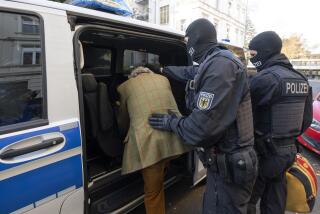2,500 Political Prisoners Ransomed by W. Germany
- Share via
BONN — A West German official disclosed Tuesday that a record 2,500 political prisoners were ransomed from East Germany last year by the Bonn government.
Heinrich Windelen, the minister for inner-German relations, made the disclosure in his annual report, but he declined to specify how much money was paid to buy the prisoners’ freedom.
“We would not like to encourage (East Germany) to stock up” on prisoners, he said.
It has long been known that West Germany regularly ransoms political prisoners in the East, but the practice is rarely announced so openly. In the past, the subject has been considered highly sensitive.
“Published reports that the number (of prisoners) released in return for economic contributions reached more than 2,500 last year are by and large true,” Windelen said in his statement.
He said the number of prisoners brought out in 1985 was the highest ever and that the number for 1986 will show a decline.
About 2,000 people are still in East German prisons for political offenses, Windelen said. He defined a political prisoner as anyone sentenced for an offense that would not be considered a crime in West Germany--for example, making contact with Amnesty International, the London-based human rights group.
Some of the ransomed prisoners are known, however, to have been agents working for West Germany.
Windelen said that more than 200 people have managed to escape from East Germany to West Germany so far this year by fleeing over the Berlin Wall or other border obstacles, an increase of 20% over the same period last year. Another 2,000 fled by hiding in ships or vehicles, using forged passports or escaping through third countries, such as Czechoslovakia and Hungary.
Also on the rise, he said, is the number of instances in which East German border guards have opened fire, apparently reflecting an effort by East German authorities to discourage escape attempts.
“East Germany has made it clear,” Windelen said, “that orders to shoot are still in force. This appears to have taken precedence over a loss of prestige abroad.”
He said that about 20,000 East Germans have been allowed to leave East Germany legally this year, about the same as in 1985 but considerably fewer than in 1984, when 35,000 were allowed to leave.
More to Read
Sign up for Essential California
The most important California stories and recommendations in your inbox every morning.
You may occasionally receive promotional content from the Los Angeles Times.













